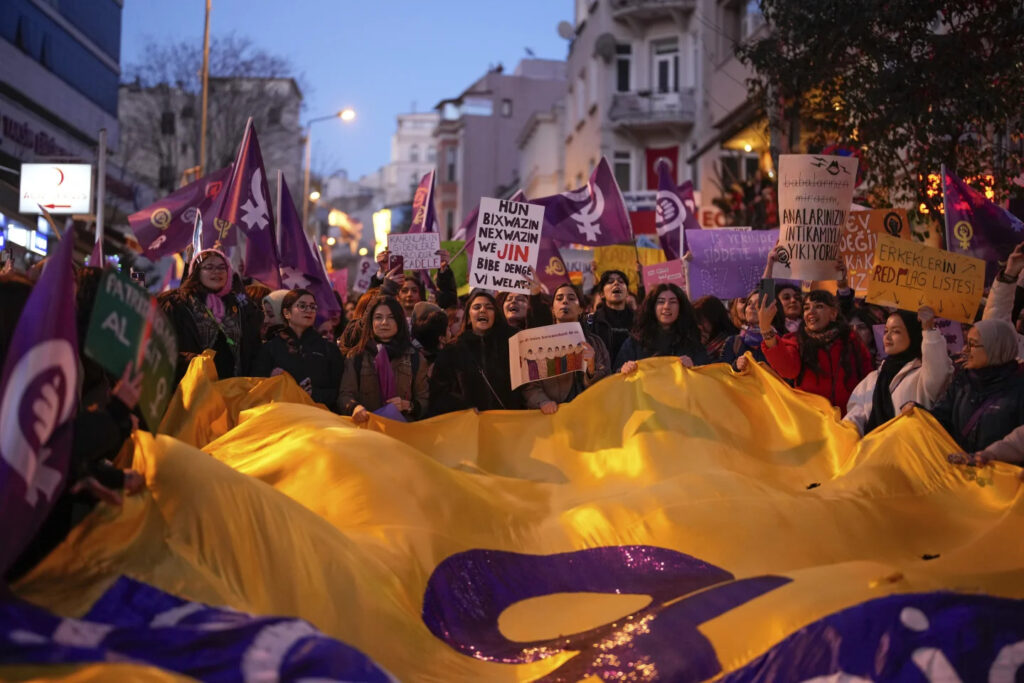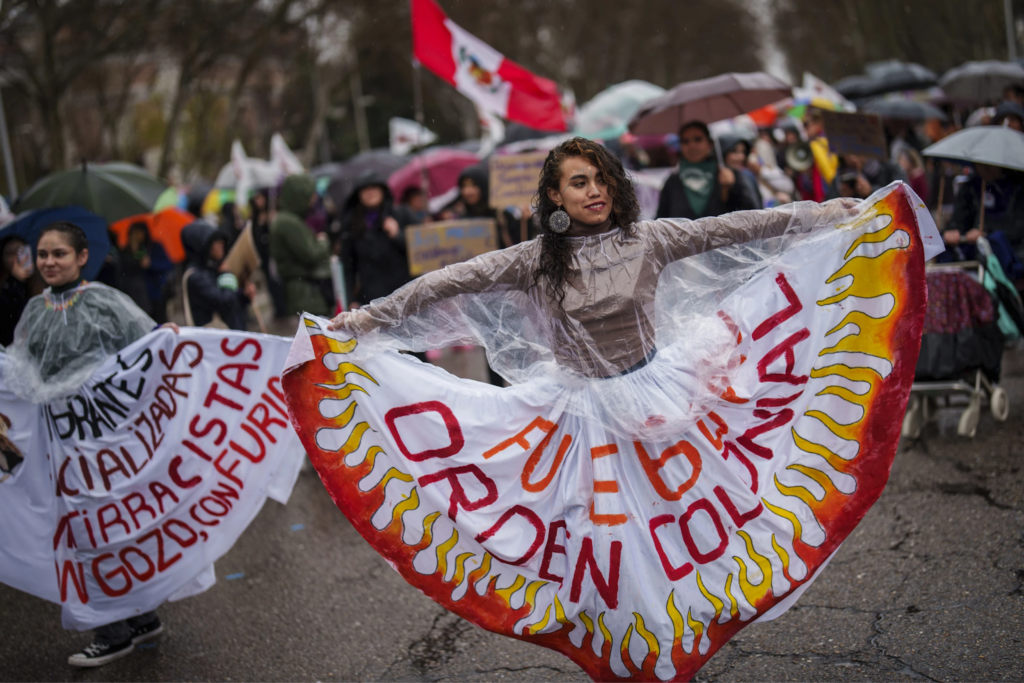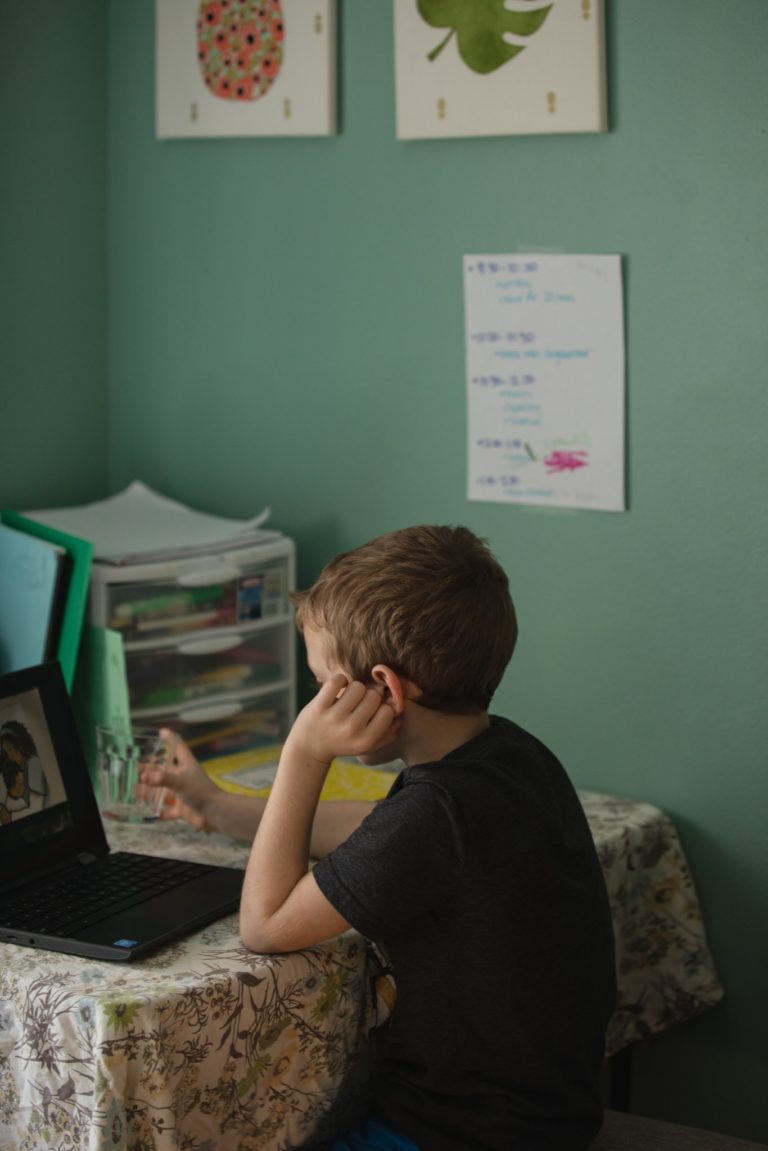
In the wake of 2025’s International Women’s Day, the feminist movement appears fractured. The world consistently feels, and is, less accepting and more dangerous for women. Every day, from the U.S. to Ukraine, from Gaza to Sudan, women face threats, their rights are stripped away, and equality continues to slip from our grasp.
International Women’s Day, which happens on March 8, is meant to celebrate women and the progress made towards gender equality. Since being officially recognized by the United Nations in 1977, International Women’s Day has been commemorated in different ways and to varying degrees in places around the world, with this year’s global theme being “Accelerate Action.” Women took to the streets of cities across the world to mark the day with demands for ending increasing global inequality and gender-based violence. In Lagos, Nigeria, thousands of women dressed in purple — the traditional color of women’s liberation — gathered at the Mobolaji Johnson Stadium, dancing and singing in celebration of their womanhood. In Ecuador, hundreds of women marched through Quito to the steady beat of drums, holding signs denouncing violence and the “patriarchal system.”

This year, despite the protests, marches, and celebrations, an underlying question lingers: is any of this worth it?
There is a concerning rise in conflict, gender-based violence, and the restriction of gender rights worldwide. According to UN Women, 24 percent of countries report that backlash against gender equality has undermined the implementation of policies that could advance rights and protections for women and girls in recent years. Nearly three-quarters of the global population live in a country under autocratic rule with curtailed rights and freedoms. A precarious global situation, insecurity, crises, and democratic decay have produced the perfect conditions for a widespread rollback of women’s rights.
However, this global regression is not solely a byproduct of geopolitical instability. The Trump administration is currently threatening both the health and rights of women domestically and the progress that women have fought for globally. His cuts to American development, humanitarian aid, and medical assistance abroad already have had disastrous effects on women and girls facing violence, armed conflict, disasters, and disease. Moreover, by befriending regimes notorious for perpetrating organized gender-based violence, Trump is undermining decades of international efforts to address the impact of war and oppression on women.
Against this backdrop, International Women’s Day can feel like a carefully curated moment of solidarity. It rallies behind causes that are palatable, media-friendly, and politically convenient, framing women’s struggles as individual success stories rather than systemic injustices.
In fact, no one really seems to agree on what feminism is, if we still need it, and whether it’s important or not. The discourse surrounding feminism is filled with horror stories of so-called “feminazis,” who seek a world free of men, and mockeries of women waiting to jump on the opportunity to wrongly accuse unsuspecting men. It centers around white feminism, which leaves vulnerable women behind and ignores the nuanced intersectionality required to uplift all women properly. Furthermore, feminist outrage is conditional, activism is selective, and solidarity is reserved for those whose struggles do not challenge Western power or threaten the systematic powers. Ultimately, feminism is divided within itself, too.
So, in a world where our rights are actively disappearing and our solidarity is fractured, what is the point of being a feminist?
Perhaps we must first acknowledge that women have overcome a lot. The feminist movement in the U.S., despite its history of racial and sexual discrimination, has had to fight every step of the way to have its humanity recognised by a bigoted state. On the other side of the world, in Libya, authorities have twice declared their intention to ban women from traveling independently without a male guardian. However, female activists met these proposals with campaigns that raised global attention and condemnation, exerting political and diplomatic pressure that resulted in the proposals being rescinded. The fact that this was possible in a country shaped by decades of dictatorship and conflict clearly demonstrates the power of women organizing together.
Beyond that, perhaps we need to accept feminism as a process — not a smooth one, but an essential one. According to Sara Ahmed, author of Killjoy Feminist, embracing feminism shifts one’s mindset and turns everything one encounters, consumes, and does into something to be challenged, questioned, and resisted. In the end, comprehending the world from a feminist perspective means seeing more, not less. It creates a more complete picture by confronting, rather than ignoring, that which compromises our happiness. In the end, the goal is to find joy in the fullness — the challenge — of living a feminist life.

One aspect of a radical feminist life is a center of creating joy that is transcendent to women’s liberation. A growing movement of self-care as activism has emerged, recognizing personal well-being as integral to fighting the oppressive system. Coined by Audre Lorde, self-care is an intentional and revolutionary practice that acknowledges the interconnectedness of personal well-being and societal change. It is not self-indulgence but an act of political warfare. Bell Hooks elaborates on this idea by encouraging us to see self-care not just as an individual act but as a communal and political endeavor. She posits that self-care is a radical act when it becomes a collective practice, fostering resilience in marginalized communities. Indeed, many activists echo the importance of joy in sustaining a long-term commitment to the feminist cause.

In the end, maybe the purpose of feminism is to remind us of the power of communal self-care and intersectionality. All of the -isms and -phobias ultimately serve the same common purpose: to keep most of us divided and marginalized in order to lift up a vaunted few: the able-bodied, affluent, straight, cisgender white men. And feminism, at its core, is about taking the side of the oppressed. It is unfinished, messy, and constantly evolving — but that is its strength. It demands that we see the world as it is and work toward what it could be. The exploration is not whether feminism is fractured but how we forge solidarity despite our differences. As Gambian activist Jaha Dukureh reminds us, “Without hope, there is no action.” Hope is not passive; it is a radical act. And so, our feminism must be, too — rooted in joy, self-care, and community, because that is how we build a future worth fighting for.
The Zeitgeist aims to publish ideas worth discussing. The views presented are solely those of the writer and do not necessarily reflect the views of the editorial board.



